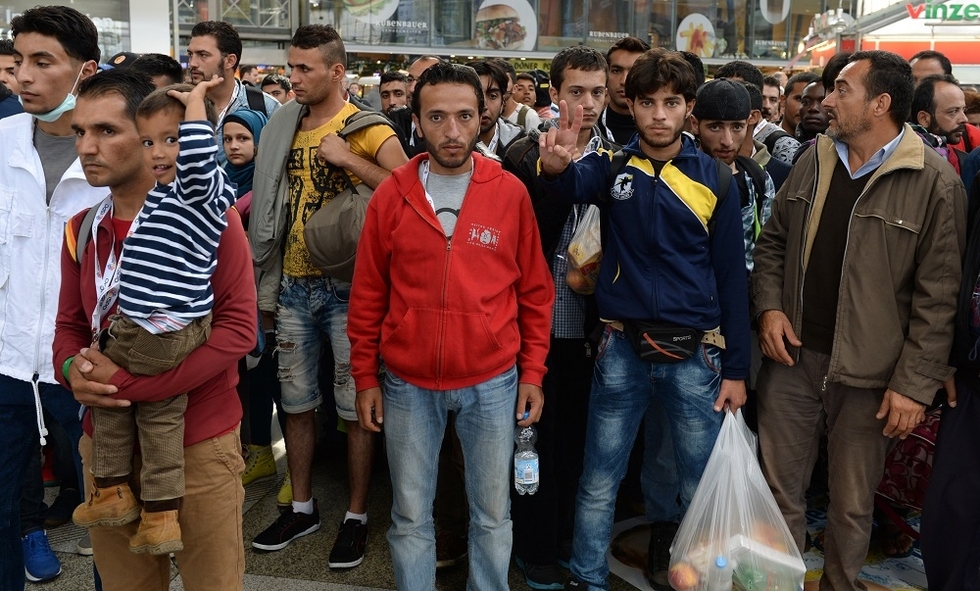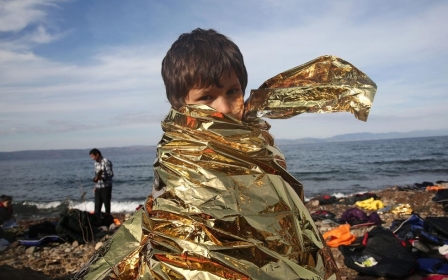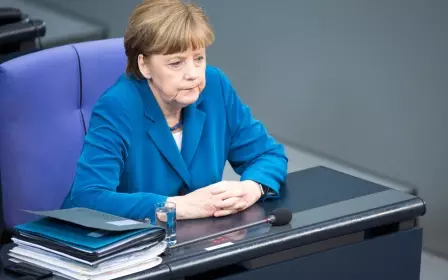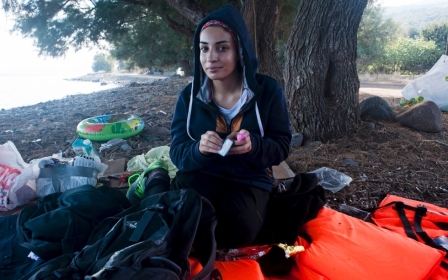EU haggles with Turkey over migrant plan

EU leaders haggled on Thursday over a deal with Turkey to stem the flow of migrants towards Europe, with Ankara demanding 3bn euros ($3.41bn) in exchange for agreeing to a plan to curb the crisis.
German Chancellor Angela Merkel warned leaders gathering for a summit in Brussels that Europe could not tackle the problem without the help of Turkey, which is hosting more than two million Syrian refugees.
"We cannot organise or stem the refugee movements without working with Turkey," said Merkel, who is due to visit Turkey at the weekend for talks with President Recep Tayyip Erdogan on the migrant crisis and Syria.
The Finanical Times reported that the German Chancellor stuck to her policy of welcoming refugees to Germany, saying isolation was not possible in the Internet age.
However she avoided the upbeat rhetoric of recent weeks which many Germans have found irritating, including hard-pressed local officials dealing with refugee housing.
Instead, she emphasised the refugee law due to pass through parliament this week, which toughens some regulations - for example, limiting cash payouts to asylum seekers.
Merkel also highlighted the importance of Turkey in trying to ease the EU's refugee crisis. Speaking ahead of a summit in Ankara on Sunday with the Turkish president, she said that all matters would be on the table, ranging from the refugees to human rights in Turkey.
Turkey is the main launching point for the more than 600,000 migrants who have entered Europe this year, most of them making the short but dangerous sea crossing to the Greek islands as they flee war in the Middle East and North Africa.
As leaders gathered, seven migrants, four of them children, drowned after their boat collided with a Greek rescue vessel near the island of Lesbos, adding to the more than 3,000 people who have died crossing to Europe this year.
But Turkey is demanding a high price for its cooperation in tackling the worst migration crisis to face Europe since World War II.
Turkish officials presented their EU counterparts with a "wish list" during talks in Ankara on Thursday, which European Commission President Jean-Claude Juncker later talked the leaders through at their summit in Brussels.
The demands included $3.4bn in aid, easing visa restrictions, opening new chapters in Turkey's long-stalled accession negotiations for EU membership, being included on the list of "safe countries" for asylum and to have more Turkey-EU summits, an EU source said.
No deal without visas
Turkish Prime Minister Ahmet Davutoglu stressed he wanted swifter moves towards visa-free travel to Europe in exchange for Ankara keeping more refugees on its soil.
"We will not sign a re-admission deal before we obtain progress on the question of Schengen visas (to the EU's passport-free area) and an easing of conditions for visas for Turkish citizens," Davutoglu told Turkish TGRT television in an interview.
But European leaders want proof that Turkey will live up to its pledges, while the three-billion-euro price tag rang alarm bells.
As part of any deal, Europe would expect Turkey to crack down on people-smugglers helping migrants make the journey to Greece, to boost coastguard patrols and to host processing camps on its soil, according to a copy of the plan obtained by AFP.
"We need guarantees that Turkey's response to our offer will be as concrete and as substantive as ours," European Council President Donald Tusk said, adding that Europe faced the possibility of a bigger wave of refugees.
French President Francois Hollande said there had to be "clear rules" on what Turkey could expect, playing down Ankara's demands for the easing of visa rules.
"There must not be an understanding that just because we want Turkey to help us by keeping refugees in its country, that there will be unconditional visa liberalisation," Hollande said as he arrived for the summit.
Europe divided again
The 28-nation European Union has been left more divided than ever by the migration crisis, especially given fears the Schengen zone could collapse as countries try to curb the huge numbers of migrants criss-crossing the continent.
Hungarian Prime Minister Viktor Orban, who has already faced criticism for his hardline stance toward migrants, announced on Thursday it had completed construction of a fence along its southern border with Croatia to stem the massive daily influx.
Croatia said more than 4,800 people had entered on Wednesday, bringing the overall number of arrivals in the EU member state to nearly 175,000.
Fresh rifts emerged, meanwhile, at the Brussels summit over plans for a controversial long-term system to redistribute asylum seekers around the bloc to take the strain off front line states like Greece and Italy.
A move by Germany and Sweden to mention the plan in Thursday's summit communique angered Eastern European states, which were overruled last month on a short-term scheme to relocate 160,000 refugees.
Plans for a European border guard system also caused divisions, with Merkel calling for "clear signals" that European countries would provide personnel to boost border forces, as well as stumping up more money.
Leaders will also discuss a possible safe zone Turkey wants to establish on its border with war-torn Syria, despite widespread scepticism in the EU, and are set to condemn Russia's military intervention in Syria.
New MEE newsletter: Jerusalem Dispatch
Sign up to get the latest insights and analysis on Israel-Palestine, alongside Turkey Unpacked and other MEE newsletters
Middle East Eye delivers independent and unrivalled coverage and analysis of the Middle East, North Africa and beyond. To learn more about republishing this content and the associated fees, please fill out this form. More about MEE can be found here.




